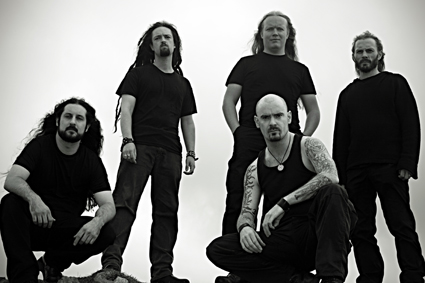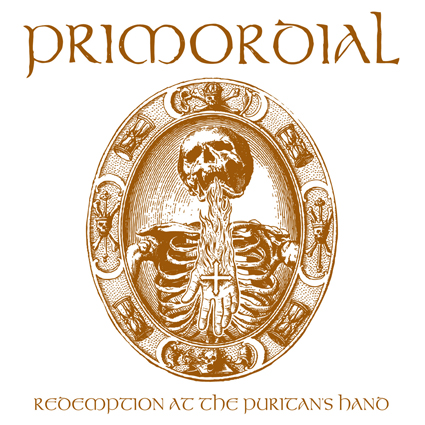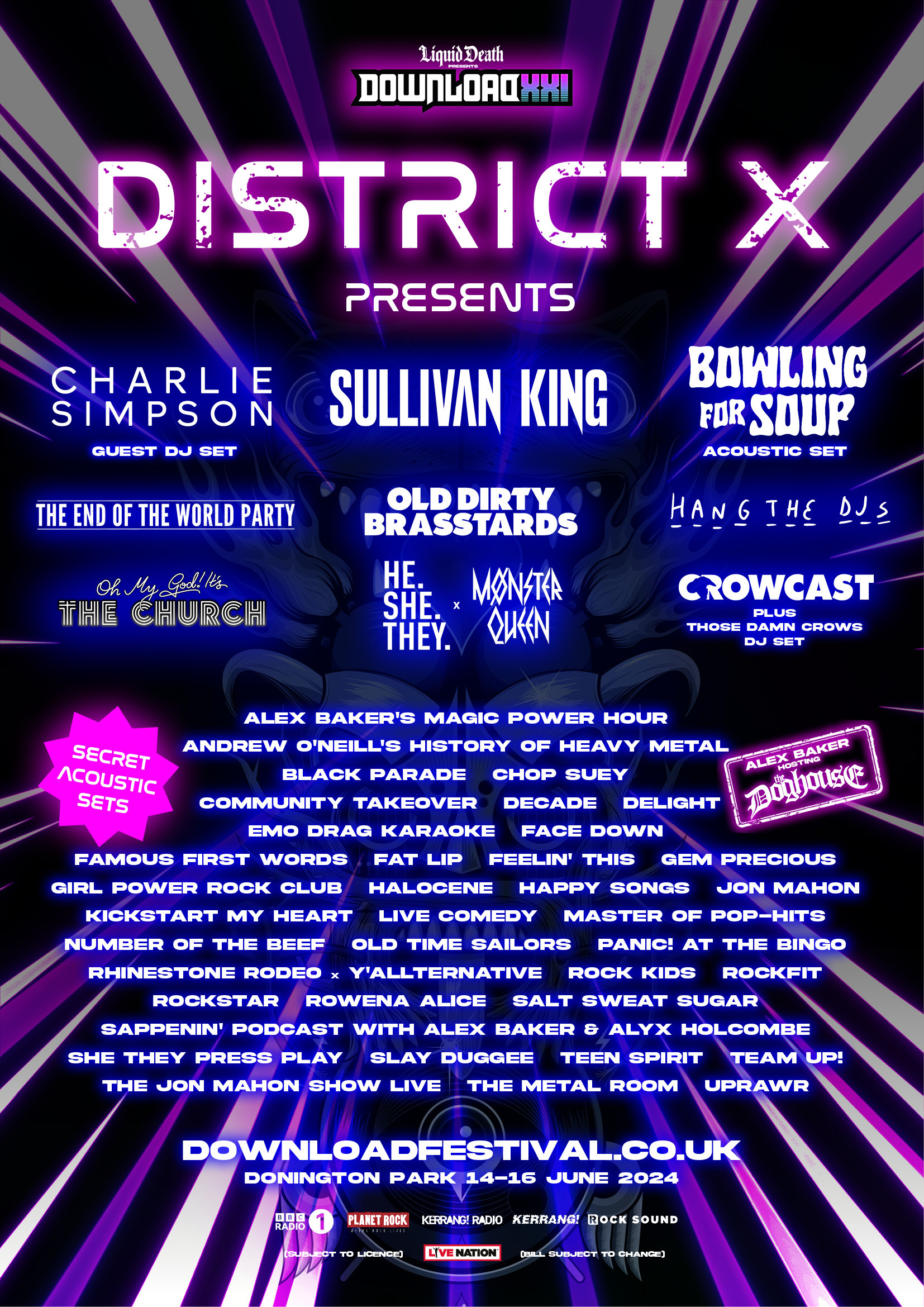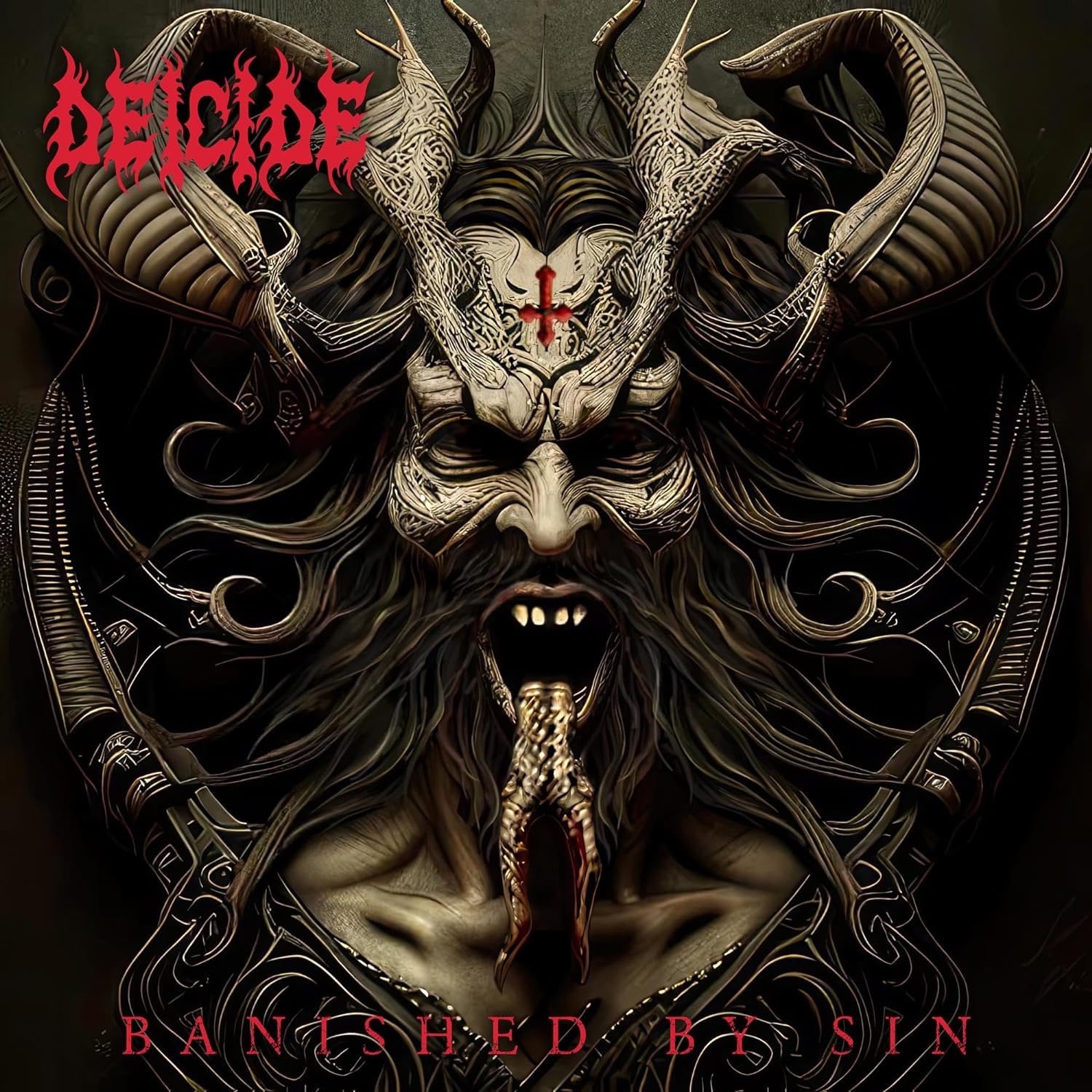Over twenty years Primordial have carved a satisfyingly unique path in metal. Occasionally dubbed ‘pagan metal’ , a tag which irritates singer Allan A. Nemtheanga no end, the band have taken influences from folk, black metal, history and literature to create a highly individualistic sound which arguably reached its peak on recent album ‘redemption at the Puritan’s hand’ – a blazing, record which never stoops from intelligent and challenging subject matter and which saw the band refine their attack still further.
Offered the opportunity to speak to Allan, we were, in truth, slightly nervous but with the singer seemingly willing to discuss each question at length we are very proud to be able to present you with this interview which covers a range of topics from changes in the music industry; an area that Allan, who works with Metal Blade, is in a unique position to shed light on; to the inspiration behind the band’s literary and often stunning lyrics.
Firstly thank you very much for taking the time to talk to us – I’d like to start by asking a little bit about Primordial as a band – I think you’ve got a pretty unique take on extreme music, one that seemed to develop almost in opposition to various record labels. I was wondering if that adversity had helped to define and shape your sound over the years?
Um – No, I don’t think that the music itself is informed essentially by how fucked up the music industry is – I mean unscrupulous labels are unscrupulous labels but I don’t think that it would have made the music particularly very different although it gave us, maybe, more determination to not give in to them and to learn a bit more about the legal reasons why they were fucking us.
You’ve progressed to incorporate a lot of different elements over the years and I was wondering how you feel Primordial have progressed as songwriters and musicians over the years?
I don’t know really – it’s the same guitar, bass drums and vocals. I mean there’s not really any other instrumental additions and it’s the same attitude as regards the music. I mean the only thing that’s changed has been the methods of recording – but technology hasn’t really altered the band and if anything you could argue that the new record is more rough and ready than ‘Imrama’ was. Yeah I mean sure we’ve evolved as musicians- it would have been ridiculous over twenty years not to have evolved – but it’s not important to me, I don’t really care about the technicality too much…
Lyrically you deal with some very weighty themes – I was wondering how long it takes you to develop original concepts into a form that you’re happy with?
Oh well – it could take… sometimes it can take ten years! I have books and books of sentences and words, bits and pieces here, scribbles and drawings, things that I’ve cut out of papers and re-written from books and then other times you could be sittign, travelling on a train somewhere on a long train journey and a sentence will pop into my head and if I’ve got a pen and paper a whole lyric can be written in twenty minutes- so really there’s no secret formulae to how I write – I don’t write to fit Primordial with the words – I just write words and you try and fit them to the atmosphere of the song.
As for the subject matter well that’s more difficult. I don’t really know how to write anything any differently. I mean I think that our approach to music has always had this weighty, mysterious, dark tone to it and that’s what I wrote when I was sixteen nd that probably says more about me than my lyrics… I don’t know really – it just doesn’t seem to work any other way. The band was born a bit out of the struggle and the rough times in the late eighties and early nineties in Ireland – there was a lot of unemployment and sacrifice involved in music which informed our attitude to wanting to create music – it was a reaction to society around us. Aaah you know I usually listened to thrash and that kind of music – but that’s not because it was the coolest thing so maybe that just set us on our serious path and then obviously black metal came along and that was the end of that.
I was wondering – the way that your lyrics come across is they have a very literary style rather than your typical lyrics and I wondered if there was some specific literature or interest that you had that led you into writing in this way?
I was always a bookish, literary teenager and always interested in reading things that at thirteen or fourteen were a little beyond me. It would be quite standard for me to try to tackle things like Umberto Ecco at fifteen and I was just always interested in literature and it just so happened that I was good with words and I wouldn’t particularly say that I was the greatest singer ever but the one thing that I can do is write lyrics – so literary themes came to me relatively easily which probably had a lot to do with my upbringing and being around books as a child and an interest in reading and always being interested in that at school.
Are there any particular authors that you like to come back to – that you take with you as being particularly important?
It kinda comes in phases – when I was an early teenager it would have been a lot of science fiction like Philip K Dick, Robert Heinlein and Isaac Asimov and all that kind of stuff. But then in late teens it was probably your HP Lovecrafts and occult horror. Then I’d go through phases where I’d love stuff like Satre and I’d love Russian stuff like Gorchakov, Dostoyevsky in my early twenties which informed gritty, grim and dreary lyrics and then as I got into my thirties it got to be an awful lot of history, eighteenth century, first world war, second world war and a lot of stuff about the formation of Europe after the industrial revolution so I don’t really have room for very much fiction these days – maybe that says more about my frame of mind as well – but it tends to be gritty, serious writers, political commentary and so o.
I don’t want to question you so much about the very personal issue of your politics but a lot of your songs – tracks such as ‘no nation on this earth’ and ‘empire falls’ – you do touch on some very global issues and I wondered how far you felt that social commentary is something that can, and should be, included in contemporary music?
Well I mean at the end of the day I’m just a singer in a metal band and not a politician… yet, especially ‘to the nameless dead’ was informed by a long look at the concept of nation building and statehood, where one race of people believe the earth belongs to them as opposed to another race… And I became very interested in the formation of both left and right in the early twentieth century, post-first world war and how we came to that position – you know, the polarisation of those two sides up to the cold war and so – no I’ve got no problem answering questions about politics – it’s more interesting than answering questions about the technical side of things – we try to be more inclusive in that sense; a lot of the time we’re lumped in with pagan metal, which I don’t agree with – and they sing in their own language and their own ideas and it’s all a bit exclusive – it excludes people and I never just wanted to write in Irish or something that could only be read understood by a few thousand people because that would just be completely pointless – I wanted to have a universal theme: sacrifice or alienation; martyrdom and statehood and all these things should be relevant whether you’re from Peru or Palestine. Whether you’re Asian or Polynesian – I’m sure there’s some debate raging about some speck of land somewhere and people can listen and think ‘yeah – he’s talking about me!” and that’s what it’s for, there’s no boundaries in that respect.
You talked about how you got involved in politics and history into your thirties, and I was wondering how much your interest was informed by your travels across Europe and seeing a lot of these places first hand?
Yeah – I was always interested in that but it maybe took a back seat to science-fiction or whatever Russian literature I was reading. Yeah of course it informs your opinion more when you’re travelling in Europe, and America, and you just look at possibly the two greatest defining moments of the twentieth century – WW1 And WW2 and the history of the towns and cities you’ve been through and if you’re interested there’s so much there to discover about the sacrifice of ordinary people or the madness and the chaos and there’s just so much in it and I just wanted to push the band more, personally, in that sort of direction; as opposed to people calling up, who’ve never even looked at the fucking lyrics, calling us ‘pagan metal’ and just assumed it’s about Irish folk-lore because it’s not, at all. There are maybe three or four songs off the top of my head, out of seventy, that are about folk-lore so that kind of thing tends to grate on me so I deliberately went the other way, not in a reactionary way, but I just wanted to write and make it as real as possible… Which is probably the reason the band isn’t bigger: because people don’t want to be reminded of how grim and dark the world actually is, they want to escape and hear romantic, fantastic tales of honour and valour…
In mainland Europe, especially the further East you go, society is… the scars of the past are something that are remembered and looked at whereas in Western Europe and England, we do tend to look to escapism more which seems to be the opposite of where Primordial come from…
Well that particular thing probably has a lot to do with – well there’s a certain generation in England that had to deal with things like the London bombing and the Manchester bombing and so on but, by the same token, on England’s soil you never had either Fascism or Communism and I think that that scar dictates an awful lot of you’re and, particularly the countries locked behind the iron curtain, their attitude to, sometimes the music and, the politics and for a lot of these countries, like the Baltic states, D day in 1945 wasn’t the end – for a lot of these countries for forty-five/fifty years the war was still going on and those kind of scars run deep, especially the further East you go – it’s just something that I relate to. I could easily write songs about folk-lore and who did this and that… not that there’s anything wrong with that, it’s all part of your culture and folk-lore, but it’s not my thing.
One of the other things that’s great about the way Primordial presents itself is the artwork and clearly a lot of time and effort has gone into that – how much are you involved with the artistic side and presentation of the band?
As much as everything – I mean I don’t sit there in front of a computer on Photoshop actually doing the images myself – it’s a good friend of ours Paul McCarroll – but generally most of the images, 70-75% or something like that, would be found or sourced by me and I’ll work closely with Paul so generally I would have a hand in most things. Even from the very first album I was trying to move away from things like putting Celtic borders in and that sort of thing because we wanted to do things on our own terms and not play on what is considered to be ‘Irishness’.
So presentation to you is obviously very important then?
Well it has to be iconic. You know when I was a kid I’d pick up ‘Morbid tales’ or ‘black metal’ by Venom or Hellhammer – you look back at all those albums and they’re simple but super-effective and they’re ingrained on your memory forever… And in some small way would hope that ‘redemption at the puritan’s hand’ – you’re not going to forget that album cover because it’s not another photo shopped barbarian with a sword or whatever – and I’ve taken all sorts of influence from the neo-folk and industrial scene – I love a lot of that stuff – Laibach and death in June, Rome and that kind of stuff, so I kind of looked at it as intelligent aesthetic…
To me that’s something that’s very important – artwork and packaging and so on – I’m an avid record collector so I really appreciate it when a band goes that extra mile, but do you think it’s something that is perhaps being lost with the rise of ITunes and IPods and the like?
Yes of course – I mean the age of the classic album is pretty much dead. There won’t be any more rock stars in the future, in fact you can probably cross the word ‘musician’ off your potential list of professions. We’re living in an age, a cultural ice-age, where we’ve reached a climate where everyone thinks that anything that is artistic or has entertainment values is their entitlement to take for free. And being part of the industry, from the inside looking out as well, because I do some work for Metal Blade and a few bits here and there, the underground isn’t immune to it either. Copies of albums that were selling two thousand copies three or four years ago – now people are pressing maybe four or five hundred of them. It’s not stopping bands, of course… I wrote an article about this for Zero Tolerance saying once the old guard dies off who fills the void at arena festivals? Are people going to go out of duty or are they going to say “well I’m not paying the same money to see Opeth and Amon Amarth filling the same space that Judas Priest had…” You know, it’s not going to work, is it? So we’re living in a weird age where attitudes are… I mean I have an IPod as well but I still collect vinyl – that’s the format I grew up with and the format I love but not everyone feels the same.
For a fifteen year old kid, music probably comes in around fourth in the list of financial importance after their phones, social networking, gaming… and then music. You know, a song is fourth or fifth. So we see that and we see… Kids will come up to us at festivals and they’ll know ‘Empire falls’ and that’s probably it, even though they have the album they’ve probably never got to song three or four… they definitely didn’t get to song eight… but that’s the Google generation…Not everyone’s like that – there’s a ground swell of people against it, but it’s hard to compete with that kind of stuff.
It’s certainly been very noticeable that there’s a lot of change and there have even been some bands who have come out and said that they aren’t going to make albums in the traditional sense any more – how has the change affected Primordial’s output?
It’s not been so bad for us. We have seen that even though ‘redemption…’ jumped out the starting block, selling twice as much as ‘to the nameless dead’ in almost every territory it slows until it then goes down in to the £8.99 price category which I think is the next one and it’s not going to pick up much before. But you know we do OK because we have history – we have twenty years of history and this is album number 7 and we have a strong reputation live and we have… just a reputation so to start at the beginning – I made this point in an article about watching In Solitude playing at Hole in the sky and it was electric… it was amazing, I mean those guys are twenty years old BUT… you know if those guys reach 30,000 sales, which is a tenth of what Hammerfall were selling, being 10% of the band quality-wise fifteen years ago, then the label will be fucking made up. But the chances of them selling even half of that is very remote so what do these guys do ? They put their energy, their commitment, their youth into this band and then what do they do… you know, they’ve got to go back to stacking shelves or they’ve got to stack shelves while playing in the band and it’s a very strange realisation that to make it work you’ve got to do a lot of other stuff to pay your way… and I just don’t know if that’s going to put a lot of people off, or they’re going to get to their mid-twenties/late twenties and chuck it in because, take it from me, there’s no more Judas Priests. There’s not going to be another Iron Maiden. There’s no more Megadeths or whatever… forget it, it’s never going to happen.. never again. And this is going to be same for pop music, or industrial music or electro music or whatever. Unless you’re… Lady Gaga, you know, but in five years she’ll be selling maybe ten percent of know… who knows.
But without being a complete profit of doom about it – there are bands that do still something, only now it might be 200,000 records whereas twenty years ago it’d be 2 million.
It’s a grim picture for young bands then…
Absolutely! It’s really grim! I’m not trying to put people off. Of course people will always want to make music and a lot of people would be quite happy to tour in the back of a van and go across Europe selling CDs and whatever… and that’s great. We’ve done that, everybody’s done that. But that becomes difficult when you reach your mid thirties, or when you have kids or when you want to settle down and have a quieter life and so that sort of adventure really is a young man’s game. Also it doesn’t help that every old band is making hay while the sun shines and charging so much money for festivals and all the other bands are getting squeezed. And that does affect us when ‘X’ old band is charging… sometimes up to quarter of a million Euro for a festival fee – and certainly over 100,000 Euro – the festival decides that they can afford maybe four of those and every other band can get fucked and it should be their privilege to play on the bill – and of course for us that’s less than we got five years ago, even though we’re selling more records and then add in the fact that cheap flights don’t exist anymore – you can’t go from Ireland to Germany for 60 Euro anymore – and it’s just a volcano – the industry is changing… so yeah it does affect us… and there’s another long answer for you!
Ok – one final question then. Where do you see yourself heading next?
To another fucking airport! I don’t know – when we made one album we never thought we’d make three. When we’d made three we never thought we’d make seven… but I mean we started when we were 16/17 years old so we’re mostly late thirties so we’re not actually that old so I don’t see any reason why we can’t go on to ten. If there’s still people buying it and showing up and still people getting involved – but while we still have the hunger and the will to do what we’re doing then I don’t think it’s going to stop. I mean it has to stop one day but I think it’ll be next year we’ve got as big tour of Europe and, at least in my mind, I want to go to Russia, Latin America and maybe China and try to play some places we’ve never been to – that’s my goal – to try to get to see a bit more of the world. If I don’t get to see another field and another backstage that looks the same I won’t be too unhappy, but the shows are always good I’ve just become a bit disillusioned with the stuff around it. I don’t know – there’s no year, or five year plan and shit happens! But we are planning to come to the UK I think in the next year for a few weeks and I think there’s something happening there…
Cool – thank you very much for your time, and patience, in answering these questions and we’ll hope to see you in the UK soon.












Leave a Reply